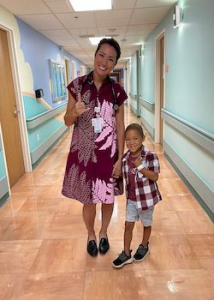
A therapy that helps modify a patient’s T cells (a type of immune cell) to make them more capable of fighting cancer was recently brought to Hawaiʻi by Stephanie Si Lim, assistant professor at the University of Hawaiʻi Cancer Center and pediatric hematologist oncologist at Kapiʻolani Medical Center for Women & Children. Chimeric Antigen Receptor T-cell therapy (CAR T-cell therapy) can result in the development of life-saving treatments for cancers that are difficult to treat.

Si Lim is leading the initiative at Kapiʻolani Medical Center for Women & Children—part of Hawaiʻi Pacific Health—to build a broader cellular immunotherapy program. A key goal of the program is to introduce CAR T-cell therapy to the medical community in Hawaiʻi in the form of clinical trials and U.S. FDA (Food and Drug Administration) approved products. This will ensure that patients have access to the best available treatments for cancer.
CAR T-cell therapy is now available to children and young adults with non-Hodgkin lymphoma and B-cell acute lymphoblastic leukemia, and will soon be available to adult patients.
The first CAR T-cell clinical trial opened on May 14, 2022, at Kapiʻolani Medical Center for Women & Children, leveraging the infrastructure and expertise of the hospital’s stem cell transplant and clinical research programs. Moving forward, all patients living in Hawaiʻi, including the neighbor islands who qualify for this clinical trial, will be able to receive treatment on Oʻahu without having to travel to the continental U.S.
Si Lim said, “We are so excited to be able to offer CAR T-cell therapy to our patients here in Hawaiʻi. This is a momentous step for our medical community as we continue to strive to offer the best and most cutting-edge therapies to patients in need.”
Currently, CAR T-cell therapy is proven to be particularly effective against B-cell malignancies and multiple myeloma—both common forms of cancer in adults and pediatric populations in Hawaiʻi. Over the next few years, it is expected that new FDA-approved CAR T-cell treatments will also be available for other cancers in the state, including breast and prostate.

